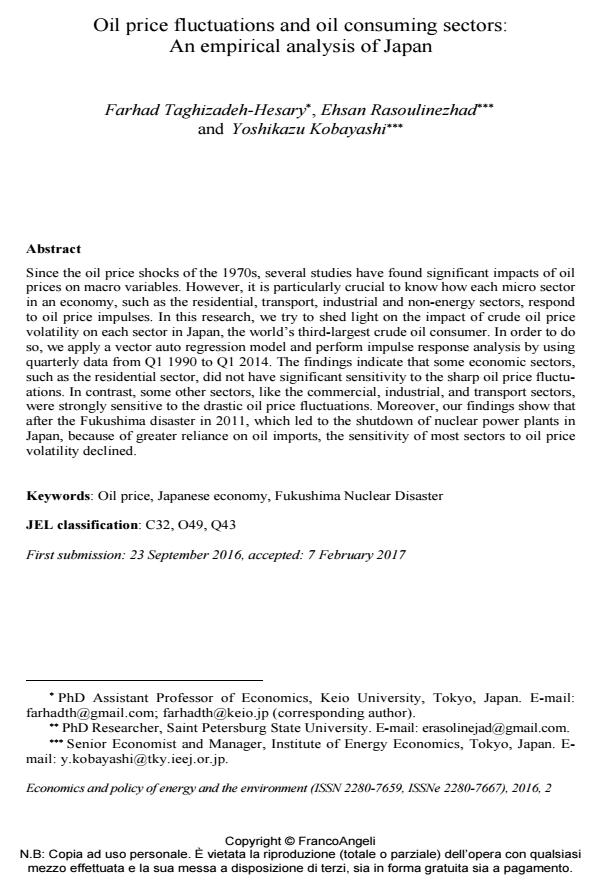Oil price fluctuations and oil consuming sectors: An empirical analysis of Japan
Titolo Rivista ECONOMICS AND POLICY OF ENERGY AND THE ENVIRONMENT
Autori/Curatori Farhad Taghizadeh-Hesary, Ehsan Rasoulinezhad, Yoshikazu Kobayashi
Anno di pubblicazione 2017 Fascicolo 2016/2
Lingua Inglese Numero pagine 19 P. 33-51 Dimensione file 315 KB
DOI 10.3280/EFE2016-002003
Il DOI è il codice a barre della proprietà intellettuale: per saperne di più
clicca qui
Qui sotto puoi vedere in anteprima la prima pagina di questo articolo.
Se questo articolo ti interessa, lo puoi acquistare (e scaricare in formato pdf) seguendo le facili indicazioni per acquistare il download credit. Acquista Download Credits per scaricare questo Articolo in formato PDF

FrancoAngeli è membro della Publishers International Linking Association, Inc (PILA)associazione indipendente e non profit per facilitare (attraverso i servizi tecnologici implementati da CrossRef.org) l’accesso degli studiosi ai contenuti digitali nelle pubblicazioni professionali e scientifiche
Since the oil price shocks of the 1970s, several studies have found significant impacts of oil prices on macro variables. However, it is particularly crucial to know how each micro sector in an economy, such as the residential, transport, industrial and non-energy sectors, respond to oil price impulses. In this research, we try to shed light on the impact of crude oil price volatility on each sector in Japan, the world’s third-largest crude oil consumer. In order to do so, we apply a vector auto regression model and perform impulse response analysis by using quarterly data from Q1 1990 to Q1 2014. The findings indicate that some economic sectors, such as the residential sector, did not have significant sensitivity to the sharp oil price fluctuations. In contrast, some other sectors, like the commercial, industrial, and transport sectors, were strongly sensitive to the drastic oil price fluctuations. Moreover, our findings show that after the Fukushima disaster in 2011, which led to the shutdown of nuclear power plants in Japan, because of greater reliance on oil imports, the sensitivity of most sectors to oil price volatility declined.
Parole chiave:Oil price, Japanese economy, Fukushima Nuclear Disaster
Jel codes:C32, O49, Q43
- 4TH SYMPOSIUM ON INDUSTRIAL SCIENCE AND TECHNOLOGY (SISTEC2022) Siti Raihana Hamzah, Nurul Afiqah Abd Haris, Norizarina Ishak, Ahmad Fadly Nurullah Rasedee, pp.050005 (DOI:10.1063/5.0172692)
- Handbook of Green Finance Akira Ogihara, pp.1 (ISBN:978-981-10-8710-3)
- China’s Trade with OPEC Member Countries: A Panel-Gravity Model Approach Ehsan Rasoulinezhad, Wei Wei, in The Chinese Economy /2017 pp.339
DOI: 10.1080/10971475.2017.1345272 - Handbook of Green Finance Akira Ogihara, pp.183 (ISBN:978-981-13-0226-8)
- CAPACITY PERMIT TRADING SCHEME, ECONOMIC WELFARE AND ENERGY INSECURITY: CASE STUDY OF COAL INDUSTRY IN CHINA XUNPENG SHI, YIFAN SHEN, KE WANG, YANFANG ZHANG, in The Singapore Economic Review /2021 pp.369
DOI: 10.1142/S0217590819500589 - A new evidence on the CIS's environmental pollution-macroeoconmic variables relationship Ehsan Rasoulinezhad, Farhad Taghizadeh-Hesary, in ECONOMICS AND POLICY OF ENERGY AND THE ENVIRONMENT 1/2017 pp.273
DOI: 10.3280/EFE2017-001014 - Handbook of Green Finance Aki Suwa, Magali Dreyfus, pp.1 (ISBN:978-981-10-8710-3)
- Japan’s Lost Decade Farhad Taghizadeh-Hesary, Naoyuki Yoshino, Ehsan Rasoulinezhad, pp.117 (ISBN:978-981-10-5019-0)
- Renewable energy and regional value: Identifying value added of public power producer and suppliers in japan Aki Suwa, in Finance Research Letters 101365/2020 pp.101365
DOI: 10.1016/j.frl.2019.101365 - Analyzing Energy Transition Patterns in Asia: Evidence From Countries With Different Income Levels Farhad Taghizadeh-Hesary, Ehsan Rasoulinezhad, in Frontiers in Energy Research 162/2020
DOI: 10.3389/fenrg.2020.00162 - Handbook of Green Finance Aki Suwa, Magali Dreyfus, pp.383 (ISBN:978-981-13-0226-8)
- A New Two-Stage Approach with Boosting and Model Averaging for Interval-Valued Crude Oil Prices Forecasting in Uncertainty Environments Bai Huang, Yuying Sun, Shouyang Wang, in Frontiers in Energy Research 707937/2021
DOI: 10.3389/fenrg.2021.707937 - Empirical analysis of factors influencing the price of solar modules Farhad Taghizadeh-Hesary, Naoyuki Yoshino, Yugo Inagaki, in International Journal of Energy Sector Management /2019 pp.77
DOI: 10.1108/IJESM-05-2018-0005
Farhad Taghizadeh-Hesary, Ehsan Rasoulinezhad, Yoshikazu Kobayashi, Oil price fluctuations and oil consuming sectors: An empirical analysis of Japan in "ECONOMICS AND POLICY OF ENERGY AND THE ENVIRONMENT" 2/2016, pp 33-51, DOI: 10.3280/EFE2016-002003